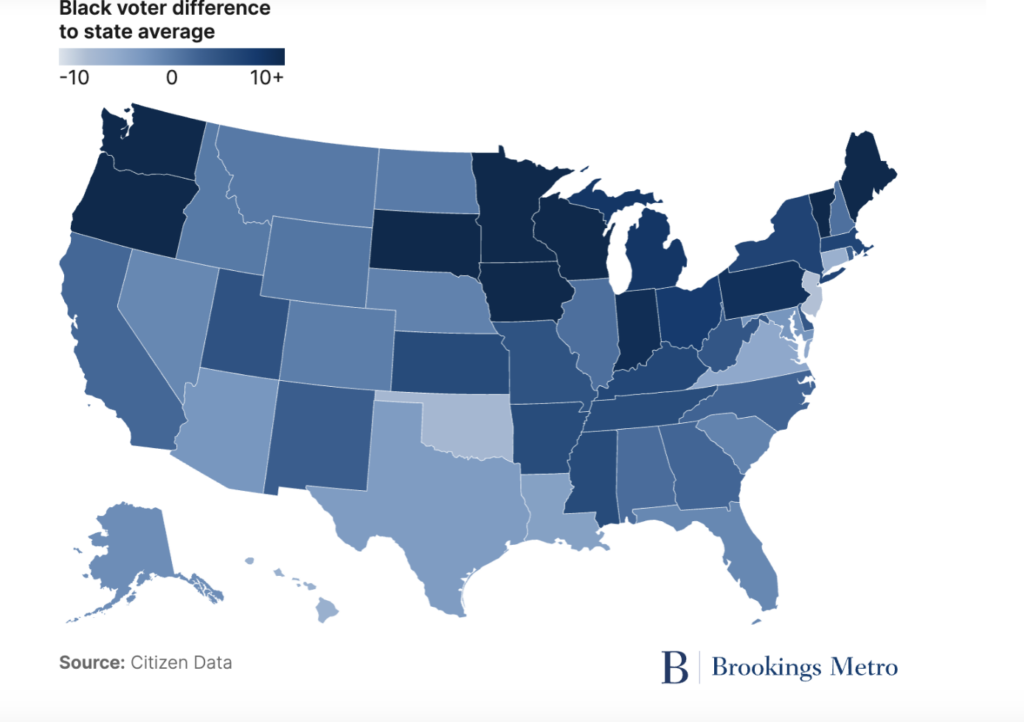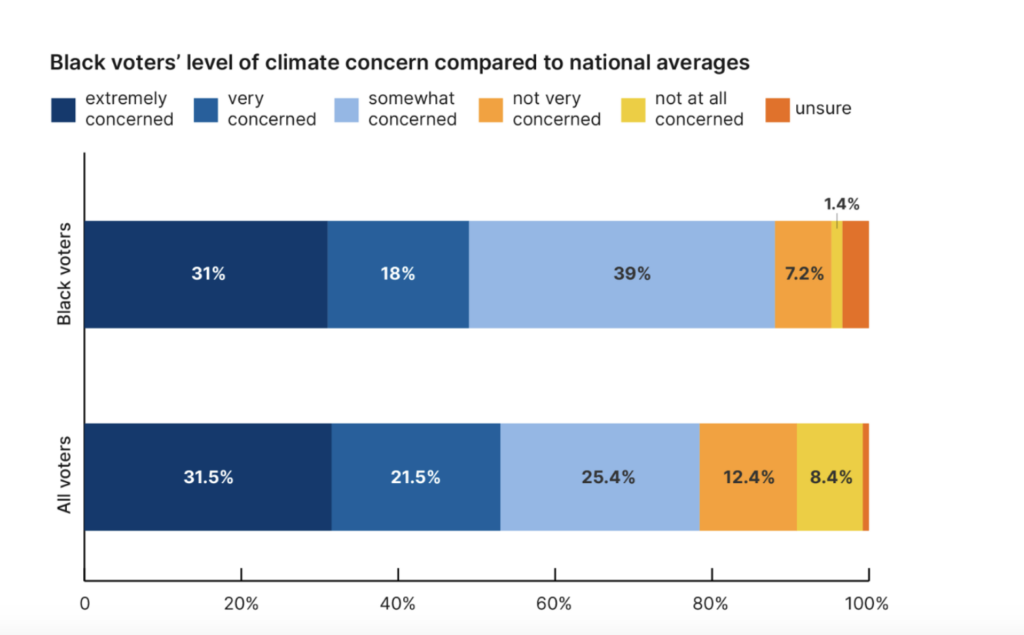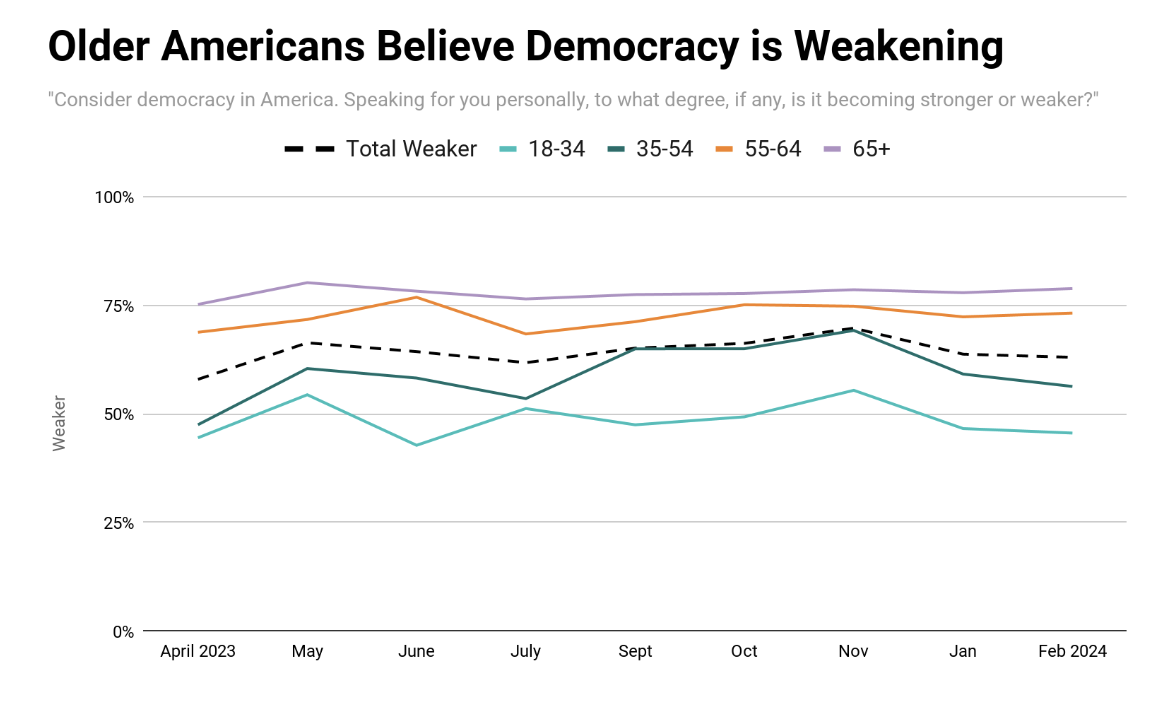Black Voters are Less Polarized around Climate Change and More Likely to Act April 22, 2024
Recent research between Brookings and Citizen Data reveals higher levels of climate concern and climate action among Black voters, as well as less polarization on the issue.

Recent research between Brookings and Citizen Data reveals higher levels of climate concern and climate action among Black voters, as well as less polarization on the issue.
Researchers from Brookings and Citizen Data recently came together to explore climate change through a lens of racial equity. Drawing on Brookings’ subject matter expertise and Citizen’s capabilities in research methods and data modeling, our analysis found evidence that Black voters have higher levels of climate concern and climate action, and are less polarized around the issue.
These findings are important in two primary ways. The first is that, by highlighting the sentiments and behaviors of Black voters, our research was able to center voices which are often made invisible by national polling. This outcome is critical to ensuring that policymakers are responsive to the needs of Black voters and create policies that are equitable and just. The second is that, by learning about the ways in which Black voters are already taking climate action, we can promote a narrative of empowerment around climate change, which highlights agency and change-making capacity.
Black Voters Are More Likely to Take Action to Address Climate Change and Support Climate Policy
A recent Citizen Data poll[1] asked respondents which actions, if any, they have taken in the past year to address climate change. Black voters self-reported having taken at least one action at a 13% higher rate than the nationwide average (56% compared to 43%). The top three actions were: 1. voting for a candidate based on their policies toward climate change; 2. signing or writing a petition related to climate change, and 3. donating money to a political organization, campaign, candidate, or cause focused on climate change. Interestingly and importantly, this was the same top three actions as the nationwide average.
Black voters are also more likely to think that the government response is either just right or not strong enough (78% compared to a 68% nationwide average). While less than one in ten (8%) Black voters perceive the government response to climate change to be too strong, compared to one in five (20%) nationwide voters.

These findings suggest that Black voters are not only more likely to take climate action themselves, but are also more likely to offer support for climate-friendly policies and policymakers.
Higher Levels of Climate Action among Black Voters Reflect Higher Levels of Climate Concern
Echoing higher levels of climate action – and likely contributing to it – climate concern was also found to be higher among Black voters. Whereas eight out of ten (78%) nationwide voters are concerned about climate change to some degree, for Black voters that number rises to nine out of ten (88%); ten percentage points higher than the national average. Moreover, climate change denialism appears to be less prevalent among Black voters, with just one percent of Black voters “not at all” concerned, compared to the nationwide baseline of eight percent. This trend is in-line with research conducted by New America (where concern among Black voters is ten percentage points higher than the nationwide baseline) and the Global Strategy Group (where it is six percentage points higher).

These survey results echo findings from Citizen Data’s climate concern model which explores belief in climate change as a real threat. Developed from Citizen Data’s proprietary in-house voter file, which contains records from millions of Americans, the model incorporates learnings from the American electorate through voter attributes, consumer data, voter behavior, and Citizen Data survey responses. By using a scoring system, the model identifies which voters are most likely to be staunch “climate change believers.” The modeled findings also show Black voters as slightly more climate concerned than the nationwide average (25% compared to 24%)[2]. Further, in 36 states, Black voters were more likely to be modeled as climate-concerned than the state average, thus adding weight to the theory that Black voters are more concerned about climate change.
While more research is certainly needed to explore the intersection of race with other demographic identities, as well as to better understand the reasons why climate concern is higher among Black voters, these initial findings are an important first step in spotlighting the sentiments of Black voters in the climate conversation.
Black Voters are Less Polarized About Climate Change
Our survey findings suggest that Black voters are less polarized when it comes to the issue of climate change. For instance, while Black voters were slightly less likely to select the “very” and “extremely concerned” categories, the same is also true of the “not very” and “not at all concerned” categories.

We see this same trend when it comes to government responsibility. While 53% of voters nationwide feel like the government is not doing enough, one in five (20%) think that the government response is too strong. For Black voters, the response is much less polarized; 51% feel that the government is not doing enough and just eight percent feel that the response is too strong.
In our deeply divided climate, where even the label of climate change can be polarizing, this finding that Black voters are less likely to be polarized around the issue is a critical one.
Data in Action:
Our findings are an early indication that Black voters take the threat of climate change more seriously, are more willing to support climate-friendly policies and personally act to address it, and are less polarized around the issue. Together, these findings have important implications for both the creation of climate change policy and the ongoing discourse around climate change as a critical issue. Next steps for moving the conversation forwards include:
- Continuing to validate these findings through scaled-up research and innovative methodologies;
- Exploring how race intersects with other demographic identities on the issue of climate change; and
- Gaining a deeper understanding of the nuanced and complex sentiments and beliefs that inform climate concern and climate action, particularly among Black voters
If you would like to learn more, or are interested in partnering with us on a custom research project, please submit a request through our website.
Endnotes:
-
Citizen Data survey from September 2023 among a random sample of 1,001 registered voters with a +/-3.1 margin of error. Results are weighted to be broadly representative of a cross section of American voters.
-
Note that we used a relatively high score (65 or higher out of 100) on the model’s climate concern scale to identify staunch climate change believers. As such, the percentages shown by the model are lower than the percentages we see in the survey data, and more in line with the survey’s “extremely concerned” group.
Share this report
Majority of Americans Concerned about Democracy
In the leadup to the 2024 elections, we started tracking democracy-related questions to provide a baseline understanding and early warning sign for our partners on critical issues that underpin a healthy democracy.
